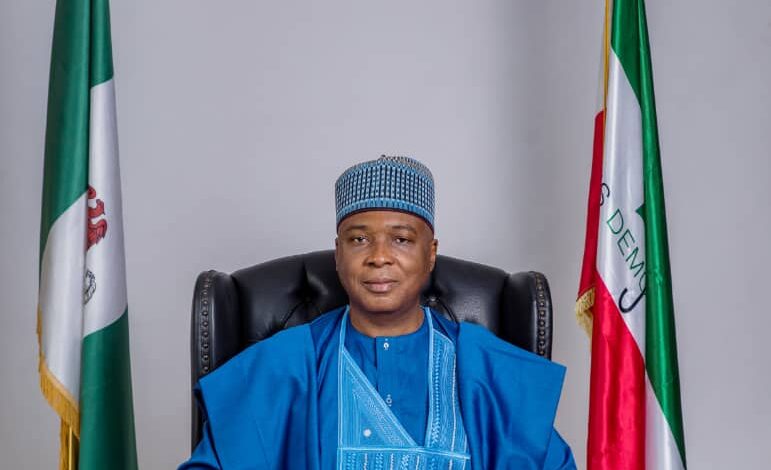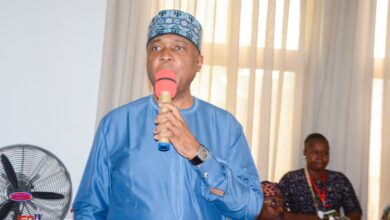Saraki Warns Against Weakening Legislature, Urges Revival of Parliamentary Strength at NASS Democracy Day Joint Session

By Omowumi Omotosho
Former Senate President Dr. Abubakar Bukola Saraki has issued a strong warning against the gradual weakening of Nigeria’s legislature, describing the National Assembly as “a shadow of what a virile and effective parliament should be.” Speaking during the Joint Session of the National Assembly attended by President Bola Ahmed Tinubu, Vice President Kashim Shettima, Senate President Godswill Akpabio, Speaker of the House of Representatives Tajudeen Abbas, other principal officers, and members of the 10th National Assembly, to mark the 26th anniversary of Nigeria’s return to democratic governance, Saraki delivered a frank and reflective speech that both praised democratic progress and challenged current leadership to protect the integrity of parliamentary institutions.
Saraki began saying: “I congratulate all Nigerians at home and abroad on the 26th anniversary of democracy. This achievement is a result of the sacrifice and perseverance by all of us, and as such we deserve a pat on the back for this.”
He paid tribute to the heroes and heroines of Nigeria’s democratic struggle, stating, “let me join all of us in remembering and celebrating our heroes and heroines of democracy who paid different types of prices and those who made various sacrifices to end military rule and return our country to democracy. Without their sacrifice, we will not be here today. From the known political leaders to the unsung and unknown protesters on the streets who lost their lives, limbs, and livelihoods during the fight against military rule. May Almighty God bless all their souls. As we praise those who helped us to achieve this democracy, we also need to commend those who have worked hard to sustain it.”





Saraki interacting with political stalwarts at the National Assembly on Thursday
In a significant gesture, Saraki applauded President Bola Ahmed Tinubu for choosing to commemorate Democracy Day within the chambers of the National Assembly instead of Aso Rock or Eagle Square.
“I want to commend President Tinubu for choosing to join the National Assembly here in this chamber to celebrate Democracy Day. This symbolic action speaks volumes. This is an acknowledgment of the fact that among the three arms of government, the one that best symbolizes, represents, and exemplifies democracy, is the parliament. Today, the Nigerian leadership did not gather in Aso Rock Villa, or the foyer of the Supreme Court, or the covered seats of Eagle Square to celebrate democracy. We are here in the Green Chamber of the National Assembly to celebrate representative government. Today’s gathering indicates clearly that the legislature is the bedrock of democracy,” Saraki said.
Highlighting key historic moments where the National Assembly had defended Nigeria’s democracy, Saraki recounted legislative interventions against military subversion in 1993, resistance to the third term agenda, and the invocation of the “doctrine of necessity” during constitutional crises.
“We all agree that the major responsibility for our generation is the sustenance of democracy and this will depend on how strong we make the legislature and so if we must continue to reinforce our democracy, we must also strengthen this institution. The same parliament had played a key role at critical periods in the life of our country. (a) In the aborted third republic, the same National Assembly in which President Tinubu served as a member faced the nozzle of the guns to resist the attempt to truncate the March to civil rule in 1993. (b) This same National Assembly in its fifth session with its heroic members resisted the attempt to foist a tenure elongation on the country in what is popularly called the third term agenda.
The same National Assembly rose to the occasion and voted down the bill. (c) In this same National Assembly, when the country also got entangled in a constitutional crisis, the 6th Assembly came up with the doctrine of necessity to forestall a collapse of the system. (d) Again in this same National Assembly, when we had a period where the executive believed the National Assembly was not even a needed institution, the 8th Assembly put its foot down and insisted on the dictates of constitutional democracy, the presidential system, and the checks and balances inbuilt into it,” he further said.
He warned, however, that the legislature seem to be drifting backwards saying: “Let me now say that except we are here to lie to ourselves, we must acknowledge the fact that the National Assembly is gradually becoming a shadow of what a virile and effective parliament should be. We owe it a duty to those who fought for the present democracy that we have and the future generations of Nigeria that will come after us to make the parliamentary institution stronger and more efficient.
Today, we seem to be drifting backwards. And we don’t have to go far to find the reason for this sad development. I am convinced that this is not only the fault of the legislature and its leadership. The executive and judiciary have consistently played key roles in undermining and weakening the National Assembly. From interference in its choice of leadership, misunderstanding its oversight role, and taking its occasional ‘No’ as being antagonistic, the National Assembly has often come under unwarranted and systemic attack.”
Saraki made a “strong appeal” for conscious efforts to revitalize the National Assembly: “I want to make a strong appeal to all of us that we need to consciously work hard to make this institution strong and vibrant. We all need to realise that by its nature, its role and character, the parliament is created to say the truth to power and scrutinize what the executive is doing. Sometimes, it will agree with the executive actions and proposals. Other times, it may disagree. One good thing is that its agreement or disagreement should always be in the protection of national interest not that of personal or partisan interest.”
He also emphasized the importance of allowing open public engagement with the legislature.
“The National Assembly should continue to be open to the people who have grievances or opinions on issues to ventilate their views, whether rational, irrational, positive, or sometimes, negative. One of the tenets of democracy is the multiplicity of opinions, freely expressed. If the National Assembly is made helpless and hopeless to the extent that the people cannot find succour there, then they will be left with no option but to run to the streets. And this is dangerous for our democracy,” he emphasized.
The former Senate President, further stressed that the structure of parliament was designed to reflect Nigeria’s multiparty democracy.
He said: “Another way to look at the importance of the National Assembly as the embodiment of our democracy is that the parliament is naturally designed to promote multi-party democracy. The parliamentary culture is so designed that the voting system is ‘AYE’ and ‘NAY’. It is not expected to be one-sided, one party, and one way. It is part of the parliamentary ethos to have the majority and minority votes on any issue. These are indications of different political parties in parliament. While the majority have their way, the minority must have their say. The minority view as represented by the opposition parties is what makes a functional democracy. We need to take note of the significance of that point.”
Looking to the future, Saraki advocated for greater inclusion of young people and women in the legislature saying: “in looking at the next 26 years ahead, we must not forget to also see how we can improve on the participation of our youths in the parliament, particularly following the passage of the Constitutional Bill tagged ‘Not Too Young to Run” Law. The same also applies to the need to devise various means towards significantly improving women’s representation in the National Assembly.”
In closing, Saraki commended the leadership of the 10th National Assembly for inviting him to speak, despite being an opposition figure.
“In closing, let me thank the leadership of the 10th National Assembly for inviting me, despite being a member of the opposition party to come and speak here on this important occasion. If it were to be in another time, they would have been looking at the body language of the President and my invite would have gotten missing. Just as my portrait was missing for four years in the Senate Gallery created for all former presiding officers. It was brought in just recently. I thank my good friend, Senator Godswill Akpabio for that. But in the spirit of parliamentary culture, this does not mean we cannot still disagree on more issues later on in the future.
Happy Democracy Day to all Nigerians. God bless our dear country. God bless us all,” he concluded.




